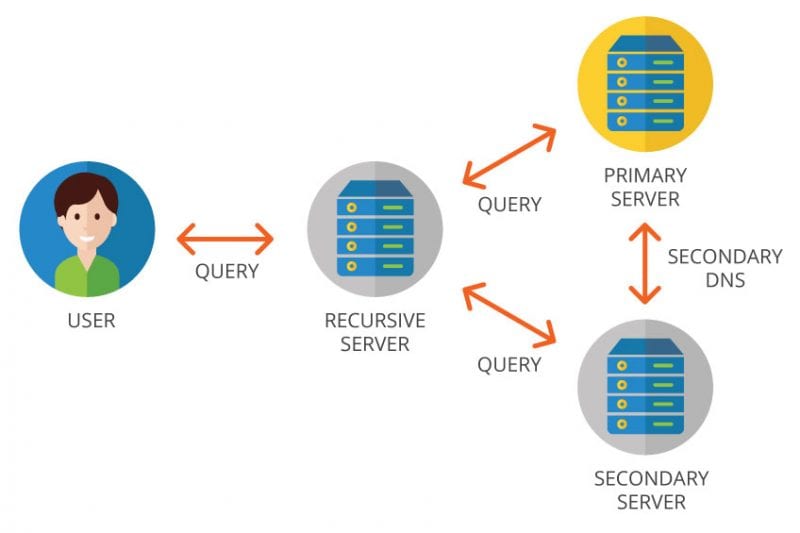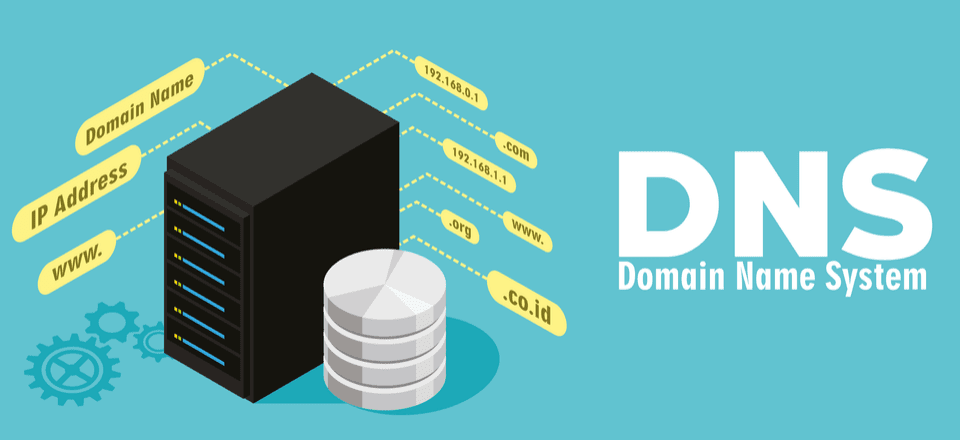When we type an address of a website on the URL bar of a browser, it simply sends a request to the Internet operator’s DNS (Domain Name System) server to resolve the IP (Internet Protocol) address, which is assigned to that domain name. Once the IP (Internet Protocol) address is obtained, another request is sent to that IP (Internet Protocol) to obtain the necessary data to present the respective web page.
List of 20 Free And Public DNS Servers
Web browsing works like this, as whenever you visit a certain website, this whole process gets repeated. However, in some cases, the operator’s own DNS (Domain Name System) server can slow this process. Hence, for this reason, it is common to use other DNS servers to speed up the interpretation of the IP address that refers to a certain domain name, and thus, it helps to increase the browsing speed. So, now without wasting much time, let’s explore this awesome list we mentioned below.
Primary DNS Server: 8.8.8.8 Secondary DNS Server: 8.8.4.4
Comodo Secure DNS
Primary DNS Server: 8.26.56.26 Secondary DNS Server: 8.20.247.20
FreeDNS
Primary DNS Server: 37.235.1.174 Secondary DNS Server: 37.235.1.177
Alternate DNS
Primary DNS Server: 198.101.242.72 Secondary DNS Server: 23.253.163.53
Dyn
Primary DNS Server: 216.146.35.35 Secondary DNS Server: 216.146.36.36
DNS.WATCH
Primary DNS Server: 84.200.69.80 Secondary DNS Server: 84.200.70.40
Cloudflare
Primary DNS Server: 1.1.1.1 Secondary DNS Server: 1.0.0.1
GreenTeamDNS
Primary DNS Server: 81.218.119.11 Secondary DNS Server: 209.88.198.133
Norton ConnectSafe
Primary DNS Server: 199.85.126.10 Secondary DNS Server: 199.85.127.10
Hurricane Electric
Primary DNS Server: 74.82.42.42 Secondary DNS Server: N/A
Level3
Primary DNS Server: 209.244.0.3 Secondary DNS Server: 209.244.0.4
Neustar Security
Primary DNS Server: 156.154.70.1 Secondary DNS Server: 156.154.71.1
OpenNIC
Primary DNS Server: 23.94.60.240 Secondary DNS Server: 128.52.130.209
OpenDNS Home
Primary DNS Server: 208.67.222.222 Secondary DNS Server: 208.67.220.220
Quad9
Primary DNS Server: 9.9.9.9 Secondary DNS Server: 149.112.112.112
Yandex.DNS
Primary DNS Server: 77.88.8.8 Secondary DNS Server: 77.88.8.1
SafeDNS
Primary DNS Server: 195.46.39.39 Secondary DNS Server: 195.46.39.40
puntCAT
Primary DNS Server: 109.69.8.51 Secondary DNS Server: N/A
Verisign
Primary DNS Server: 64.6.64.6 Secondary DNS Server: 64.6.65.6
UncensoredDNS
Primary DNS Server: 91.239.100.100 Secondary DNS Server: 89.233.43.71
What is a primary DNS server and a secondary DNS server?
Let me clarify one thing the primary DNS (Domain Name System) server is the preferred DNS (Domain Name System), and the secondary is the alternate DNS (Domain Name System). Inserting both in the configuration of the network adapter means that you are simply adding a layer of redundancy, simply because, if an error occurs in one, the other one will simply start its work. In addition to the third-party DNS (Domain Name System), servers that are searched to offer faster browsing are also searched to avoid registering the activity in web browsing and accessing websites blocked by the operator. However, we all have to remember that they do not provide faster web browsing, as some can allow you to avoid listing activity. Therefore, it is convenient to read all the details about the server you want to use.
How to find the best DNS, and what to look for in them?
To find the best DNS (Domain Name System), we have several types of tools like the Namebench, which is available for the tech giant Microsoft’s Windows, the tech giant Apple’s Mac, and Linux as well, as we told earlier in this para that this tool will help you to find the best DNS for your network connection. Second, we can use the well-known DNS Jumper tool, as it is one of the best tools currently available on the Internet to modify the configuration quickly. At the time of opting for the DNS servers, we will address, in addition to speed, other issues as well; for example, we will also have to search if the responsible company keeps records or not of the visited addresses and if it sells that information to third parties or not. And not only that, but we also have to look for security to know if it has DNSSEC and DNSCrypt.
How to change DNS in Windows, Linux, and macOS?
Changing the DNS of our operator by any of the third-party DNS is simple. For this, we will follow these steps according to our operating System. If you want to change them at the router level and apply them to all computers and connected devices, we give you the keys at the end.
Steps for Microsoft Windows:-
First, open Windows search and type Control Panel. Next, open the Control Panel app. On the Control Panel, click on the Network and Internet Settings On the next screen, click on the Change adapter options Right-click on the adapter and then select Properties Then select the Internet Protocol version 4 (TCP/IPv4) and then select Properties Activate Use the following DNS server addresses Now simply complete with the chosen DNS
Steps for macOS:-
System preferences Net Select the connection in use and then click on Advanced Now navigate to the DNS tab, then press the + button, and now add your desired DNS
Steps for Linux:-
First, go to System. Then select preferences Now select the Network connections. After that, select connection and press on the sprocket Now modify DNS in the IPv4 section
These are our best DNS recommendations for you. Hence, as a suggestion, we recommend you try some of these alternatives to find one that meets your expectations. So, what do you think about this list? Share all your views and thoughts in the comment section below.


